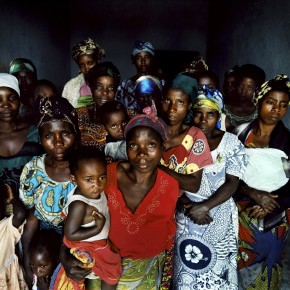The use of sexual violence in conflict is an issue that has finally received the recognition it deserves, and I am proud to be part of the movement to end this crime. Since assuming the position of Special Representative of the Secretary-General on Sexual Violence in Conflict I have travelled to countries where rape as a weapon of war has been used against girls and women, and when you hear their stories of terror and degradation you know that one rape in war is one too many.
Unfortunately, the shame of these abuses is not endured by the perpetrator; rather it is borne by the survivors of these attacks. It is the victims and their families, not the attacker, who must deal with the devastating and long lasting consequences of this crime, which can include sexually transmitted diseases, damage to reproductive organs and health, depression, unwanted pregnancies, and social stigmatisation.
Girls and women suffer disproportionately from this crime and this is not by accident; when you attack a mother, a wife, a sister or a daughter you are attacking the very fabric of society. By assaulting girls and women you wreak havoc on society, weaken the resistance of an opposing side, and ensure that communities will struggle to recover from the devastating repercussions of sexual violence long after the conflict has ended.

I have listened to the heartbreaking stories of survivors and their pain is tangible, even years after the attack. These women are often abandoned by their husbands, cast out by their families and ostracised by their communities. As a result, they face a life of poverty and marginalisation because of what they have endured. These women ask for justice and want their attackers held responsible for their actions. They ask for a helping hand to start the process of rebuilding their lives. They are in need of medical care to heal the physical and mental wounds they have sustained. And they ask that we put an end to this crime so that they can emerge from the shadows where they hide in shame for what has happened to them.
The effect and use of sexual violence in each country is unique. In Syria, the threat of sexual violence was a major contributor to displacement as families fled in an attempt to get girls and women safe. Unfortunately, this had the unintended consequence of early and enforced marriages as parents married their daughters off to older men in an attempt to keep them safe. In turn this led to trafficking of girls and women.
Each country has untold stories that the world will never hear. For this reason, we must be the voice of the voiceless and ensure that these women and girls are not just statistics referred to in media reports, but human beings whose rights are being trampled and lives cut short by this atrocity. The stories of these girls and women have fuelled my determination to stand with these survivors and end what has been called "history’s greatest silence" by being their voice on the international stage.
The past decade has been one of change, showing the commitment of the international community to break this silence. During the 68th UN General Assembly 135 countries endorsed the Declaration of Commitment to End Sexual Violence in Conflict. Initiatives such as these show that change is possible and that the plight of millions of victims of this crime will no longer be ignored, and along with resolutions adopted by the Security Council and the Declaration to Prevent Sexual Violence in Conflict endorsed by G8 nations, the international community has finally stood up to say that wartime rape is not a women’s issue, it is a peace and security issue and deserves to be treated as the war crime that it is.
I hope that the High-Level Event on protecting girls and women in emergencies galvanizes public support and reinforces the resolve of those already dedicated to ending sexual violence in conflict and securing donors who share our goal. I hope that with this increased and renewed support, we can make even more progress toward ending this rights abuse that has been tolerated for far too long, in far too many places. We must pursue a global zero tolerance policy on sexual violence in conflict so that girls and women know they are protected and so that perpetrators know their crime will not go unpunished. It is time that we come together to end sexual violence everywhere and ensure that it claims no more victims.
--------------------------------------------------------------------
Please note, this is a guest blog. Views expressed here do not necessarily represent the views of DFID or have the support of the British government.
For full details of the UK's work on protecting girls and women, please visit: Improving the lives of girls and women in the world's poorest countries.

1 comment
Comment by Jane Wathome posted on
The UN is deluding itself if we think donor-funded programs are the solution.
Why is there no conversation about the underlying drivers of rape? Can we imagine a world without war? A world where the number one export from the West to poor countries is not weapons ? A world where the West's primary interest in Africa is not the minerals. Can we imagine a world where our sons are defenders and protectors of their sisters, mothers, aunts, nieces instead being their sexual assailants.
The west stands by, in some cases accelerates the conditions that give rise to conflict and then swoops in with humanitarian aid. No amount of aid can restore the desecration of human dignity inflicted on millions of women and girls across the world in the name of power and control.